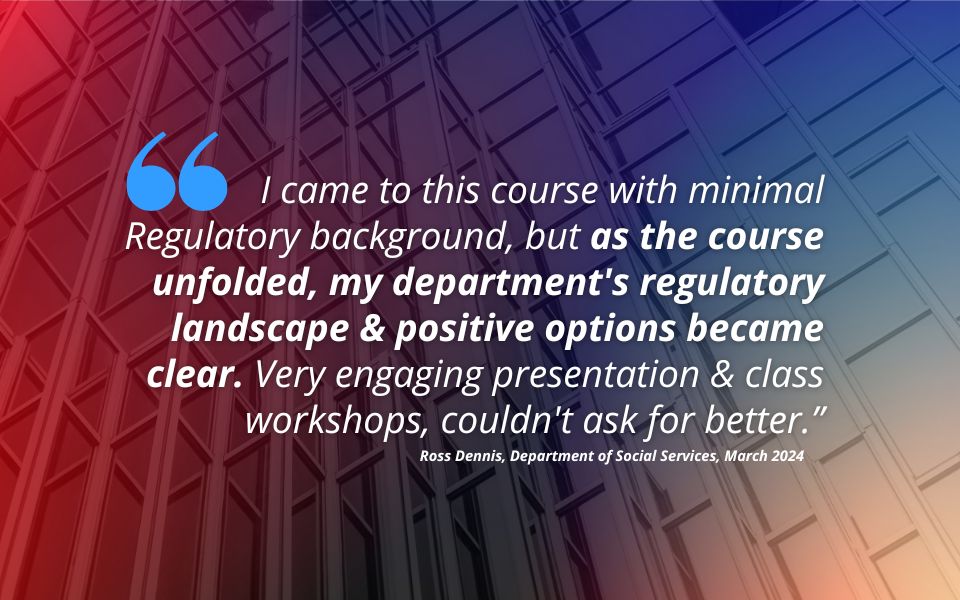Core Issues in Regulatory & Risk-Control Practice


Gain expert insights on the core issues in regulatory & risk-control practice.
The CIRRP seminar covers fundamental questions in regulatory design and examines specific contemporary puzzles currently demanding attention from Australasian regulatory bodies. It thus provides a suitable orientation for newcomers to the regulatory business, appropriate for practitioners at any rank—from the front line to the Boardroom, and every level of management in between. It also offers seasoned regulatory professionals an opportunity to examine the broad array of possibilities in terms of regulatory strategy and practice and to use that richer picture as a backdrop for reflecting on their own past experiences and considering their future aspirations and plans.
Please note that this program emphasises management and practice of risk-control operations (i.e., regulatory practice) as opposed to the reform of law itself (regulatory policy). It is also oriented more towards social regulation (provision of safety, health, & security) rather than economic regulation (managing the efficient functioning of specific markets).
You will have opportunities, both during class discussions and outside class-time, to raise other issues you currently face and to draw on your own professional experience.

Professor Malcolm K Sparrow
Malcolm K Sparrow is a leading international expert in regulatory and enforcement strategy, security and risk control. Malcolm is the Professor of the Practice of Public Management at Harvard’s John F Kennedy School of Government and he is Faculty Chair of the school’s executive program “Strategic Management of Regulatory and Enforcement Agencies.”
Professor Sparrow served 10 years with the British Police Service, rising to the rank of Detective Chief Inspector. He has conducted internal affairs investigations, commanded a tactical firearms unit, and has extensive experience with criminal investigation. His research interests include regulatory and enforcement strategy, fraud control, corruption control, and operational risk management. He is also a patent-holding inventor, and dead serious at tennis.
What to expect


An unparalleled learning opportunity: Across the four sessions, attendees will have the chance to take a deep dive into key regulatory concepts with Professor Sparrow in an interactive, engaging teaching format


Suitable for regulatory practitioners at any rank: From the front line to the Boardroom and every level of management in between
An audience favourite: See why over 1900+ past attendees have given Professor Sparrow a 97% speaker satisfaction rating

Attend and learn
- The relationship between compliance management and risk-control objectives
- Four different types of work—functional work, process-based work, problem-based work, and crisis response—and how they all fit together
- The role that values play in governing regulatory decision-making
- Defining and measuring success – The evolving nature of the regulatory performance account
- Special (“Wicked”) classes of Harms which complicate the task of controlling them
- How professional regulators can respond constructively to “de-regulatory” pressures
Who will attend
This course is designed principally for federal, state and local government regulatory and enforcement practitioners but is also suitable for anyone whose job entails risk-control or harm-reduction responsibilities (e.g., members of professional boards).
The course is suitable for both newcomers to regulatory practice, as an orientation, as well as seasoned regulatory professionals

Agenda
Times are shown in AEDT
Welcome remarks, virtual learning tips & course introduction
Session 1: Core Issues in Regulatory Strategy (A)
- Distinctive nature of the risk-control task
- Setting the mission
- Promoting Goods versus Controlling Bads – operational implications
Break
Session 2: Core Issues in Regulatory Strategy (B)
- The nature of regulatory craftsmanship
- Four different types of work, and the challenge of integrating them
Break
Session 3: Current Issues in Regulatory Strategy (1)
- Developing an organisational capacity for problem-centric work
- Implementation challenges
Summary of the day & preparation for tomorrow
Close of Day 1
Reflections/comments/queries arising from Day 1
Session 1: Managing & Measuring Performance (A)
- What constitutes “success” in a risk-control setting
- Potentially perverse metrics, and the harm they can do
Break
Session 2: Managing & Measuring Performance (B)
- The role of analysis in support of risk-control
- Telling the story of “risks identified and controlled”
Break
Session 3: Managing & Measuring Performance (C)
- Designing the regulatory cockpit
- Simulator training!
Summary of the day & preparation for tomorrow
Close of Day 2
Reflections/comments/queries arising from Day 2
Session 1: Values at stake in regulatory practice (A)
- Recognising the demons
- The values we embrace in order to keep the demons at bay
- How positive values sometimes conflict with each other
- Resolving the conflicts, and justifying the choices involved
Break
Session 2: Values at stake in regulatory practice (B)
- Distinctive nature of the regulatory environment
- Obligations to different stakeholdersForms of accountability
- Different types of discretion, and the relationships between them
Break
Session 3: Current Issues in Regulatory Strategy (2)
- Developing constructive responses to de-regulatory pressures
Summary of the day & preparation for tomorrow
Close of Day 3
Reflections/comments/queries arising from Day 3
Session 1: Alternate Regulatory Structures (A)
- Delegating risk-control responsibilities to regulated communities. When is it safe, and under what conditions?
- Historical trends in regulatory policy. Understanding the effects of regulatory “fashion.”
- Lessons from Civil Aviation
Break
Session 2: Alternate Regulatory Structures (B)
- Developing a more discriminatory approach to the management of alternate regulatory structures
- Safety Management Systems: strengths & weaknesses
- Choice of structures for control of catastrophic risks
- When prescriptive regulation and self-regulation co-exist
Break
Session 3: Special (“Wicked”) Classes of Risks—an overview:
- Various ways of categorising risks
- Characteristics of risk that frustrate those responsible for controlling them
- Brief introduction to:
- invisible risks
- risks involving conscious opponents (adversaries)
- catastrophic risks
- performance-enhancing risk-taking
Closing remarks
Close of course
Online
Access the full course online with excellent connectivity facilitated by our event platform and experienced IT, AV and delivery teams
Pricing
Early bird savings until 22nd of November
+GST
Early bird pricing
Save $800
Early bird savings until 20th of December
+GST
Early bird pricing
Save $600
Early bird savings until 14th of February
+GST
Early bird pricing
Save $400
Early bird savings until 7th of March
+GST
Final early bird pricing
Save $200
Standard Rate
+GST
Price after early bird savings
Attend with your colleagues! Save with our group discounts.
Groups of 10+ save 10%
Groups of 20+ save 20%
Really well run event with superb content. Very worthwhile.”
Claire O'Brien
Public Servant Aged Care Quality and Safety Commission March 2023
Professor Sparrow delivered an exceptionally well-constructed course. The attention to detail, specific examples that were relevant to the participants, and the depth of understanding of the topics made for a very engaging four days.”
Megan Dalton
Assistant Director, Department of Climate Change, Energy, the Environment and Water, March 2023
I highly recommend this seminar to all regulators who want a broader understanding of their role in society and the economy.”
Chris Bourne
Manager, NOPSEMA March 2023
I would recommend attending this seminar for those in the regulatory field – it provides robust discussions specific to the areas the attendees work within as well as case studies which capture key points of regulatory practice.”
Natalie Quessada
Senior Technical Officer, Department of Agriculture Fisheries and Forestry, March 2023
“I came to this course with minimal Regulatory background, but as the course unfolded, my department’s regulatory landscape and positive options became clear. Very engaging presentation and class workshops, couldn’t ask for better.”
Ross Dennis
Assistant Director, Department of Social Services, March 2024
“Very interesting, the examples provided were very detailed and informative.”
Craig Upton
Compliance & Enforcement Branch, NDIS Quality & Safeguards Commission, March 2024
“Professor Sparrow is at the top echelon of regulatory practice, and it is a must for any sound Regulator to attend one of his presentations.”
Tony Monardo
Senior Licensing Officer, Department of Energy, Environment & Climate Action, VIC, March 2024
Please note that this program emphasises management and practice of risk-control operations (i.e., regulatory practice) as opposed to the reform of law itself (regulatory policy). It is also oriented more towards social regulation (provision of safety, health, & security) rather than economic regulation (managing the efficient functioning of specific markets).
You will have opportunities, both during class discussions and outside class-time, to raise other issues you currently face and to draw on your own professional experience.
